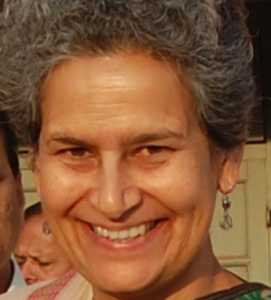Chanda Nimbkar – Director of Animal Husbandry at the Nimbkar Agricultural Research Institute (NARI)

Dr. Chanda Nimbkar forms a powerful voice in the world of animal science and genetic research. From being a small-town girl in the Taluka of Phaltan, she is now the Director of Animal Husbandry at the Nimbkar Agricultural Research Institute (NARI), an Adjunct Faculty at the ICAR-National Dairy Research Institute , and a Trustee for the International Livestock Research Institute board. However, as she likes to describe it, Dr. Nimbkar’s path towards success has not been a straight-line trajectory.
Dr. Nimbkar’s journey began at a Marathi medium school when she placed third in her tenth-grade board exams. Everyone thought that these scores meant that she would pursue the sciences. “But I was always a rebel by nature, so I decided to pursue commerce.” Dr. Nimbkar went on to do her Bachelor’s in Commerce from the University of Pune where she received a gold medal in advanced statistics. Upon completing her BCom, she returned to Phaltan because she did not want to pursue the chartered accountancy studies she had started while doing B. Com any further. People all around her told her that she was wasting her education and foregoing a good career. But her parents were extremely supportive. “Don’t let anyone tell you that anything you do is a waste because it is not.”
After returning to Phaltan, she began to care for the family farm where she then lived for two years, learning goat keeping and growing many kinds of crops. After that, she went to Brown University in the U.S. to do her master’s in economics, but one thing was clear: she did not know what to pursue; she did not know her mind. At age twenty-four, she once again returned to tend to her farm. By now, her father who ran the Nimbkar agricultural research institute had opened an animal husbandry division and Dr. Nimbkar had begun working on some projects with him. They invited a scientist, Dr. Gerald Wiener through the British Council to give a report regarding the institute’s work in sheep breeding and future targets. Dr. Wiener suggested that someone from the institute should train in the field and so Dr. Nimbkar found herself at the University of Edinburgh, pursuing her master’s in animal breeding, and this set the course for her future. After her master’s, she returned to India to understand the situation and later received her PhD from the University of New England, Australia.
Now, Dr. Nimbkar is known for her work on the NARI Suwarna twinning sheep project. Her research institute undertakes several projects including providing training to farmers and veterinarians and advising women farmers in Bihar regarding Bengal goats. She also serves on the international advisory committee for the Centre for Tropical Livestock Genetics and Health and was a part time member of the Swaminathan commission on Farmers. She is most interested in improving the income of farmers. In the future, she hopes to continue doing what she is currently. “I have very good data that needs to be analyzed so I look forward to publishing that.” She further hopes to popularize her field, guide goat-keepers, simplify the concepts as much as possible, and perhaps do some advocacy.
Dr. Nimbkar has faced both encouragement and stereotypes in her journey. Coming from a family that endorsed training in occupational therapy, women and widows’ education, and contraception in India, she grew up in an empowering environment. Her own parents – her father starting a research institute and her mother being a writer – constantly inspired her, her husband has always supported her, and she met several successful geneticists during her career. “I continue finding new sources of inspiration every day.” However, agricultural science finds very few women, especially at the top. Dr. Nimbkar has often had to contend with being the only woman at meetings or even at drinking sessions with her colleagues. “I couldn’t find the drinking experience pleasant. It felt very clandestine and I didn’t like the atmosphere.” This sort of isolation is common and can lead to the imposter syndrome. In fact, Dr. Nimbkar found her decision to pursue genetics being questioned, her credentials not being given accurately at forums, and her small stature leading to her voice not being heard. “You have to constantly assert yourself” and that is exactly what Dr. Nimbkar did by calling out anyone who didn’t take her seriously. Now she hopes to change the situation in rural Maharashtra as well. “I keep needling the village men when they make comments about women. But rural Maharashtra is in transition as many more fathers become proud to educate their daughters.”
Women bring a different perspective to science and she hopes to see more joining her field. “If someone tries to undermine you because you are female, don’t get deterred. I know that the humiliation can come from people within your family too. Sometimes even husbands say things to their wives and show contempt. Don’t stand for that. Reason with members of your family. Just be very determined and go ahead and do things.”
